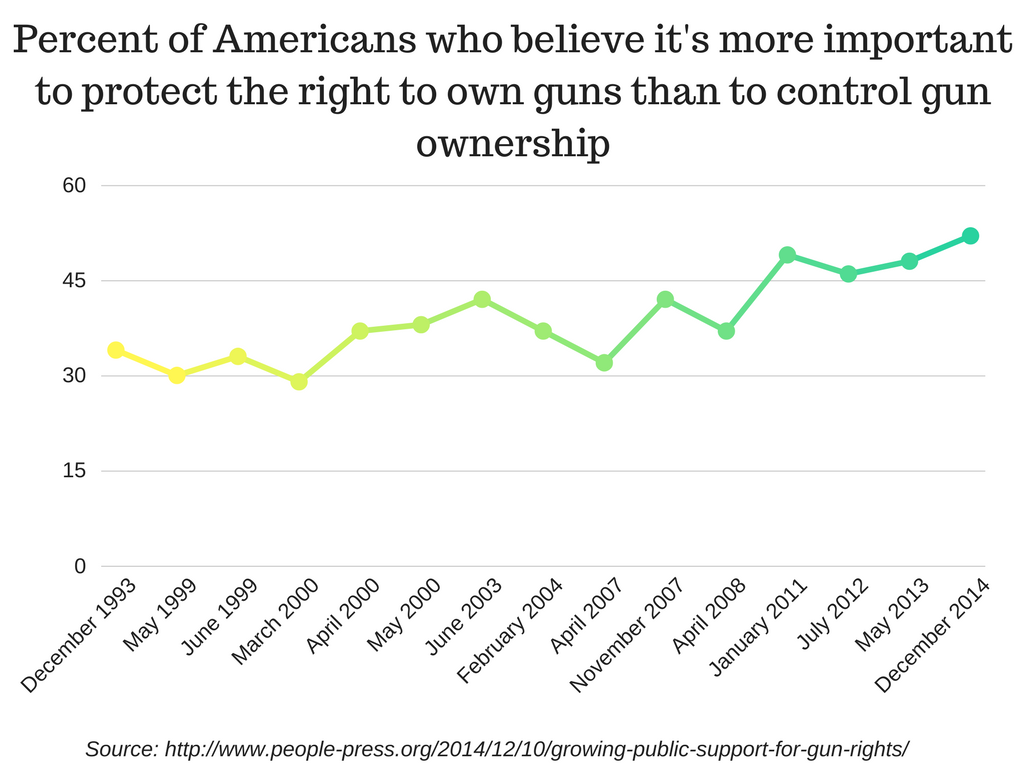Editor’s note: this story pairs with “How to change someone’s mind”
Caleb Keeter spent his life as a proponent for the Second Amendment — until he found himself in the middle of the shooting at the Route 91 Harvest festival in Las Vegas on Oct. 1, 2017.
Fifty-eight people were killed and more than 500 were injured in the shooting, making it the worst mass shooting in modern American history.
Keeter, the lead guitarist for the Josh Abbott Band, said in a tweeted statement members of the crew had concealed handgun licenses and legal firearms on their bus.
“They were useless,” Keeter said in the statement. “We couldn’t touch them for fear police might think that we were part of the massacre and shoot us.”
Keeter said the shooting made him realize how wrong he’d been and that the U.S. needs stricter gun control.
“My biggest regret is that I stubbornly didn’t realize it until my brothers on the road and myself were threatened by it,” Keeter said.

It’s hard to know how and why people change their minds, but “changing someone’s opinion is arguably one of the most important challenges of social interaction,” Cornell University researchers said in an article about online arguments.
Hal Miller, a behavior analyst in BYU’s Psychology Department, said even measuring people’s opinions is difficult.
Psychologists and surveys often measure people’s opinions based on what they say, “but there isn’t really anything to prevent that person from lying to us and our not detecting it, so these are rather fragile measures of a strongly held opinion,” Miller said.
Behavior analysts like Miller instead measure people’s opinions by looking for “patterns of behavior consistent with that strong opinion,” Miller said.
Phrases such as “changing your mind” are just figures of speech, according to Miller.
“We have no ‘mind,’ and as such, we simply behave,” Miller said.
For example, recycling and using reusable grocery bags might be behavioral evidence of a person’s belief in protecting the environment.
But even finding behavioral evidence can be difficult depending on the opinion, according to Miller.
BYU psychology professor Mikle South said social factors — such as expressing opinions and others reacting to them — play an important part in people’s opinions.
“Especially when you’re uncertain about something, you’re more likely to kind of go with what people around you are doing,” South said.
Utah Valley University alum Mike Campbell said his political beliefs used to be based on his community’s “default position”: being conservative.
“I didn’t really pay too much attention to anything,” Campbell said. “I think that’s how most people’s political views are.”
Campbell said he liked to debate and argue with others about his views, but his opinions were based more on political affiliation than what was right.
“Anything that (George W.) Bush did, I would try to justify it and say that it was the right thing,” Campbell said.
But Campbell said he became jaded toward politics when he returned from his mission in 2007 and it became obvious to him the war in Iraq wasn’t justified.
In 2011, he read “Liberty Defined” by Ron Paul and “went from an indifferent conservative Republican to outspoken libertarian in 300 pages,” Campbell said in a Facebook comment.
Campbell said he now believes the government shouldn’t be involved in anything except protecting citizens’ property rights and personal freedoms.
“I probably had the beginnings of libertarian leanings before, as people would kind of explain them to me,” Campbell said. “I’m always open to reason, to debate, and if somebody shows me a better way, if somebody shows me a more effective way to think or believe, then I’m all for it.”
Once someone makes a decision, they often stick with it, “come hell or high water,” South said.
That’s partially because there are negative social consequences to “flip-flopping,” according to South.
“If we’re dithering all the time, people don’t know what to think of us,” South said. “If we’re constant, people know what they’re getting.”
South compared the idea to a scene from the musical “Hamilton” in which Alexander Hamilton is asked which presidential candidate he would vote for: Thomas Jefferson or Aaron Burr, both of whose politics he disagreed with.
The character sings:
“I have never agreed with Jefferson once
We have fought on like seventy-five different fronts
But when all is said and all is done
Jefferson has beliefs; Burr has none.”
People are constantly choosing how to use their resources, and what really happens when people say they “changed their mind” is one option became more valuable than another and they reallocated their resources, according to Miller.
Miller, who studies how perceived gains and losses affect decision making, said positive and negative social consequences can play an important role in what people say they believe.
For example, if the majority of someone’s community believes in government-mandated vaccination, a person might receive praise for publicly expressing the same opinion. That praise could be considered a gain.
However, that person might also lose attention or receive criticism for publicly saying that vaccines cause autism, which could be considered a loss.
These social consequences for publicly expressed opinions are particularly potent in the age of social media, Miller said.
But Campbell said he didn’t worry about the negative consequences of changing his opinion.
“I like to find what’s true, and I know that if that’s my number-one priority, then I’m not going to have to defend something that’s not right,” Campbell said. “That’s really the most liberating part about what I found, is that I don’t have to defend things I don’t believe in, ever.”




